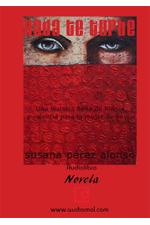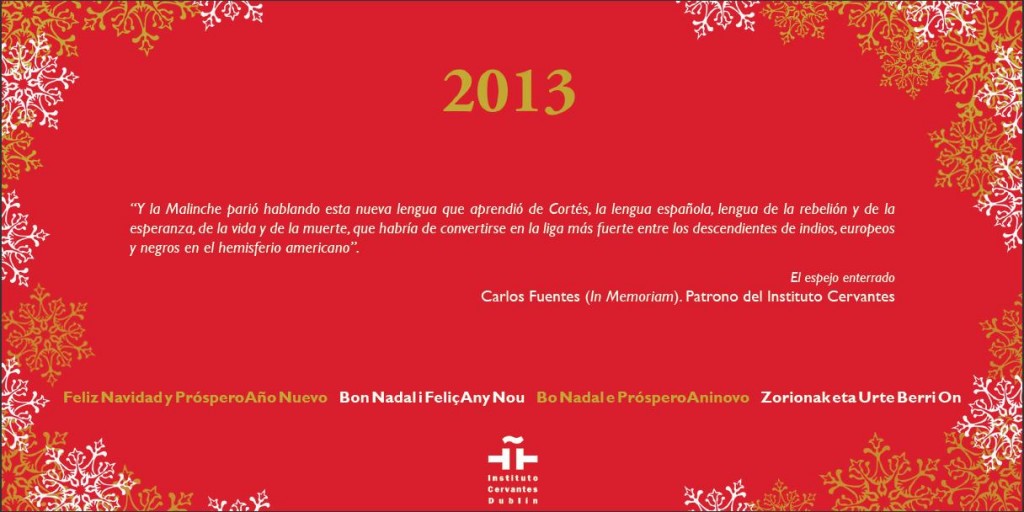Blog del Instituto Cervantes de Dublín
Torre Martello
Novedades en la biblioteca: Febrero 2013 | New to the Library: February 2013
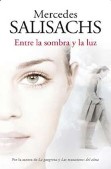 Las novedades de la biblioteca pueden ser consultadas en nuestro catálogo en línea, como es habitual.
Las novedades de la biblioteca pueden ser consultadas en nuestro catálogo en línea, como es habitual.
Para ello, seleccione ÚLTIMAS ADQUISICIONES y elija el período de tiempo que le interesa: ”el último mes” o “los últimos tres meses”.
Ésta es nuestra selección para los meses de febrero de 2013.
The lastest additions to the library catalogue can be consulted on line as usual. 
Click ÚLTIMAS ADQUISICIONES and choose the time period: “el último mes” or “los tres últimos
meses”.
This is our selection for February 2013.
Audiolibro de la semana | Audiobook of the Week: Citas en Manhattan
El audiolibro de la semana es Citas en Manhattan de Emma Reverter, periodista catalana afincada en Nueva York. Para descargar esta divertida reflexión sobre la dificultad de las relaciones de pareja, haz click aquí.
Victoria Sachs es una atractiva e inteligente periodista, especializada en política internacional que vive en Manhattan. Con la llegada del calor recibe el encargo de escribir una columna ligera para el suplemento veraniego de su periódico y, al no ser su especialidad, tiene miedo de fracasar. Victoria investigará y compartirá con los lectores las novedosas posibilidades que ofrece el mercado para encontrar a nuestra media naranja. Citas en Manhattan es una novela ácida, divertida e inteligente sobre el mundo de las citas en Nueva York, una tendencia que se ha convertido en un auténtico fenómeno social.
The audiobook of the week is Citas en Manhattan by Emma Reverter, a Catalan journalist who resides in New York. To download this funny reflection about relationships, click here.
Victoria Sachs is an attractive and intelligent journalist living in Manhattan and specialized in international politics. As summer approaches, she gets the assignment of writing a light column for the summer supplement of her newspaper. It is not her speciality and she´s afraid of failing. Victoria will research and share with the readers the different possibilities offered in the market to find our better half. Citas in Manhattan is a witty, funny and smart novel about the dating world in New York, a trend that has become a social phenomenon.
Autor del mes | Author of the Month: Rafael Gumucio
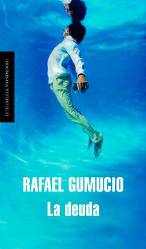
Nuestro autor del mes de febrero es el chileno Rafael Gumucio (Santiago, 15 de enero de 1970) que recientemente nos visitó durante el Festival ISLA.
Es hijo del historiador Rafael Luis Gumucio y nieto del político de izquierda Rafael Agustín Gumucio. Cursó sus estudios en Literatura en la Universidad de Chile y tras el golpe militar de 1973 se vio obligado a exiliarse en Francia donde residió varios años antes de poder regresar a Chile. Posteriormente también vivió en España donde permaneció hasta el 2004.
En 1999 publicó Memorias prematuras un libro donde el escritor narra su vida; el exilio con su familia en Francia, su regreso a Chile, su fracaso con las mujeres, sus inicios en el periodismo y la vida universitaria. Para muchos es lo mejor de su producción.
Es autor entre otras obras de Monstruos cardinales (2002), Comedia nupcial (2002), Páginas coloniales (2006) etc. Destacan especialmente Los platos rotos (2004), un ensayo histórico que une cuento, teatro, novela y narrativa y repasa la historia de Chile y también La deuda (2009), novela inspirada en el caso del contador de las estrellas, un estafador que engañó a artistas y animadores.
Ha escrito para publicaciones tan prestigiosas como La Nación, El Mercurio, La Tercera, El Metropolitano, Las Últimas Noticias, El País, ABC y el New York Times, así como en las revistas Apsi, Rock & Pop, Fibra, de la que fue creador y editor general, The Clinic, de la que también fue uno de sus fundadores.
Ha sido también animador, guionista y realizador de programas de televisión como Gato por liebre (Rock & Pop Televisión, 1995-1998) y del programa de humor absurdo Plan Z, que recibió múltiples censuras.
Es director del Instituto de Estudios Humorístico de la Universidad Diego Portales y humorista-locutor del programa Desde Zero de Radio Zero, junto a Patricio Fernández y Claudia Álamo. En 2004 resultó ganador del Premio Anna Seghers y fue finalista del Premio Altazor en los años 2000 y 2003 con Memorias prematuras y Monstruos cardinales.
Te esperamos en la biblioteca con lo más destacado de la obra de Rafael Gumucio.
The author of the month of February is Chilean writer Rafael Gumucio (Santiago, 15th January 1970) who recently visited us during the ISLA Festival.
He is son of the historian Rafael Luis Gumucio Rivas and grandson of the left-wing politician Rafael Agustín Gumucio. He studied Literature at the University of Chile. After the 1973 Chilean coup d´etat he lived as an exile in France before returning to Chile. He also resided in Spain for several years until 2004.
He published his first novel in 1999, Memorias prematuras (Premature memoirs) a book where the writer narrates his life; the exile with his family in France, his return to Chile, his failure with women, his first dabblings in journalism and university life. This book is considered his best work to date.
He has written among others: Monstruos cardinales (2002), Comedia nupcial (2002), Páginas coloniales (2006) etc. The most relevants are Los platos rotos (2004), an historical essay that has something of short story, theatre, novel and narrative telling the history of Chile and also La deuda (2009) a novel inspired in the case of the “star meter”, a con man who tricked artists and entertainers.
He has written for the newspapers La Nación, El Mercurio, La Tercera, El Metropolitano, Las Últimas Noticias, El País, ABC and New York Times and for the magazines Apsi, Rock & Pop, Fibra, of which he was founder and general editor and The Clinic, of which he was also one of its founders.
He has also been conductor, script-writer and producer of television shows like Gato por liebre (Rock & Pop Televisión, 1995-1998) and of the absurdist humour show Plan Z (TV show), which was censored more than once.
He is director of the Instituto de Estudios Humorísticos of the Universidad Diego Portales and comedian-host of the Desde Zero show on Radio Zero with Patricio Fernández and Claudia Álamo. He won the Anna Seghers Award in 2004 and he was short-listed for the Altazor Award in 2000 and 2003 with Memorias prematuras and Monstruos cardinales.
We hope to see you at the library with a selection of Rafael Gumucio´s work.
Audiolibro de la semana | Audiobook of the Week: Cuando fumar era un placer
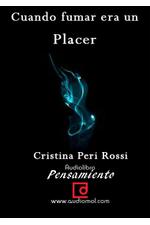 El original audiolibro que te recomendamos esta semana es Cuando fumar era un placer de la excelente escritora y ex fumadora empedernida Cristina Peri Rossi. Para descargar este audiolibro solo tienes que seguir dos pasos: hacer click aquí y meter tus datos de usuario de la biblioteca.
El original audiolibro que te recomendamos esta semana es Cuando fumar era un placer de la excelente escritora y ex fumadora empedernida Cristina Peri Rossi. Para descargar este audiolibro solo tienes que seguir dos pasos: hacer click aquí y meter tus datos de usuario de la biblioteca.
Hoy por hoy, cuando el fumar ya no es un vicio sino casi un pecado, la autora da un repaso a lo que fue su vida en compañía de la cajetilla de cigarrillos. Desde sus días de infancia en Montevideo, cuando decidió que su destino sería convertirse en una mujer tan libre y hermosa como las señoras que tomaban café y fumaban en los bares céntricos de la ciudad, hasta el diario que describe sus primeros meses de abstinencia, cuando ni escribir, ni amar, ni leer, ni charlar con los amigos tenía sentido sin el aroma de un pitillo, toda una historia de amor y odio se desgrana por las páginas de este libro insólito y muy íntimo.
Es un homenaje a un vicio que fue amor, dice la autora, a una relación más larga que un matrimonio, compañero que nos mata lentamente.
The original audiobook that we recommend you this week is Cuando fumar era un placer by the excelent writer and ex heavy smoker Cristina Peri Rossi. To download this audiobook you only have to follow two steps: make click here and enter your library card number and password.
At the present time smoking is considered not only a vice but almost a sin. The author reviews her life as a former smoker. From her childhood days in Montevideo, when she decided that her destiny was becoming a free and beautiful woman, just like the ladies who used to drink coffee and smoke in the bars in the city center to the diary where she describes her first months without smoking. Writing, loving, reading or talking to friends had no sense without the smell of a cigarette. A love-hate story is told through the pages of this unusual and personal book.
It ´s a tribute to a vice that according to the author was love, a longest relationship than marriage, a partner that kills us slowly.
Audiolibro de la semana | Audiobook of the Week: Nada te turbe
El audiolibro de esta semana es uno de los éxitos más inesperados de los últimos años. Se trata de Nada te turbe de Susana Pérez-Alonso. Para descargarte esta historia que te enganchará desde el primer momento solo necesitas dos cosas: tu carnet de la biblioteca y hacer click aquí.
“Nada te turbe” es el propósito que una mañana se hace Catalina Béjar de Prado. Ella, Catalina y sus amigas son las protagonistas de esta novela. Catalina Béjar de Prado es una mujer progresista hasta donde le conviene. Catalina Béjar de Prado se casó con un “igual”, eso es lo que ella creía. En el fondo, Catalina se casó para escapar. Nunca supo de qué tenía que escapar, pero ese fue su propósito. Ahora, en la cuarentena, Catalina se nota permanentemente turbada y no escatima esfuerzos para dejar de estar así. El problema es su casa, su hija, su marido, su trabajo, su madre, su hermana, sus amigas, el amante, la mujer del amante, la política, la globalización, la anorexia, los gimnasios, el magnesio…
The audiobook of the week was one of the most unexpected successes of the last few years. It´s the novel Nada te turbe by Susana Pérez-Alonso. To download this engaging story you just need two things: your library card and make click here.
“Let nothing disturb you” is the resolution made one morning by Catalina Béjar de Prado. Catalina and her friends are the main characters of this novel. Catalina Béjar de Prado is a liberal woman to a certain point. She got married to someone “like her”, that´s what she thought. Deep down, Catalina got married in order to escape. She never knew exactly what she was escaping from but that was the purpose. Now that she is in her forties Catalina finds herself permanently distraught and she spares no effort to stop feeling like that. The problem is her home, her daughter, her husband, her job, her mother, her sister, her friends, her lover, her lover´s wife, politics, globalization, anorexia, gyms, magnesium…
Audiolibro de la semana | Audiobook of the Week: Las otras vidas
El primer audiolibro que te recomendamos este año es Las otras vidas de la autora argentina Clara Obligado. Para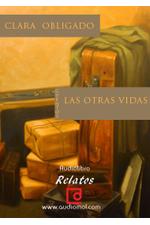 descargar el libro solo necesitas tu carnet de la biblioteca, hacer click aquí y ¡voilà!
descargar el libro solo necesitas tu carnet de la biblioteca, hacer click aquí y ¡voilà!
Clara Obligado nos ofrece cuentos de desarraigos, exilios, partidas y retornos, de encuentros y desencuentros. Cuentos desgarrados, intensos, sin embargo vitales y esperanzadores, alternan la tragedia y la comedia, lo real y lo irreal, la otredad con que todos convivimos, nuestras “otra vidas”.
Escritos, como dice la autora, “desde ningún lugar y desde varios a la vez”, estos relatos nos interrogan sobre el destino, sobre qué hubiera sucedido si, en lugar de un camino, hubiésemos tomado otro.
The first audiobook that we recommend you this year is Las otras vidas by Argentinian writer Clara Obligado. To download this book you only need your library card, make click here and voilà!
Clara Obligado brings a collection of tales about uprooting, exile, departures and returns. These are heart-breaking and intense stories, full of life and hope where tragedy and comedy, real and unreal things mingle with the otherness, with our “other lives”.
As the author says: “These tales are written from nowhere and from several places at the same time”. These stories question us about destiny, about what it could have happened if we had taken one way instead of the other.
Felices fiestas y feliz año 2013
Hoy es nuestro último día de apertura. Mañana ya estaremos celebrando las fiestas. Todo el equipo que forma el Instituto Cervantes de Dublín os desea unas muy felices fiestas y un muy feliz año 2013.
Last day working before Christmas. Instituto Cervantes in Dublin is closed tomorrow. We wish you a Merry Christmas and a very happy 2013.
Nollaig Shona agus athbhliain faoi mhaise daoibh go léir!
[Video] Entrevista a Ángel Guinda / Interview with Ángel Guinda
Ángel Guinda (Zaragoza, 26 de agosto de 1948) ofreció una charla en el Instituto Cervantes de Dublín el pasado 22 de octubre: Poesía útil: lectura comentada. Nuestra compañera Carmen Sanjulián lo entrevistó con motivo de su visita a nuestro centro. Edición de video: Cris Méndez.
Ángel Guinda es un escritor español conocido sobre todo por su poesía, aunque su obra abarca géneros muy variados: artículos en periódicos y revistas, ensayos y traducciones.
Fundó la Colección Puyal de libros de poesía en 1977 y la revista Malvís en 1988. Ha publicado más de una veintena de libros y es coautor de la letra del Himno de Aragón. En 2010 fue galardonado con el Premio de las Letras Aragonesas.
El Instituto Cervantes de Dublín y la editorial Olifante ofrecieron este recital poético del autor español Ángel Guinda, quién mostró una proyección de videoclips sobre su poética (Arquitextura) y Manifiestos (Poesía útil, Antimanifiesto, Manifiesto No) además de videopoemas. A los audiovisuales les seguió una lectura comentada por el propio autor y un coloquio. Presentó y conversó con el autor Jennifer Wood (NUI Maynooth)
Instituto Cervantes Dublin and Olifante Publishing House are delighted to present this poetry recital by Spanish author Ángel Guinda. He screened a series of video clips about his poetry (“Arquitextura”) and Manifestos (“Poesía útil”, “Antimanifiesto”, “Manifiesto No”) as well as video poems. The videos were followed by a recital with comments by the author and a Q&A session. Introuced by Jennifer Wood (NUI Maytnooth)
Ángel Guinda (Zaragoza, August 26th, 1948) is a Spanish writer known mainly for his poetry, although his work extends to various genres: newspaper and magazine articles, essays and translations.
He founded the Colección Puyal of poetry books in 1977 and the Malvís magazine in 1988. He has published over twenty books and is the co-author of the lyrics to the Aragón anthem. In 2010 he received the award Premio de Letras Aragonesas.
Audiolibro de la semana | Audiobook of the Week: El huésped
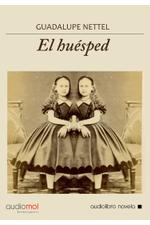 El audiolibro de la semana es una de las propuestas más interesantes de la literatura mexicana reciente: El huésped de Guadalupe Nettel. Para descargarte esta historia fascinante necesitas la tarjeta de la biblioteca y hacer click aquí.
El audiolibro de la semana es una de las propuestas más interesantes de la literatura mexicana reciente: El huésped de Guadalupe Nettel. Para descargarte esta historia fascinante necesitas la tarjeta de la biblioteca y hacer click aquí.
La extraña historia de una niña habitada interiormente por un ser inquietante, quizás imaginario, quizás no. Ana sostiene una lucha silenciosa contra esa hermana siamesa, hasta que el huésped comienza a manifestarse en su entorno familiar de una manera devastadora.
Alrededor de esa presencia se fraguan los acontecimientos de una vida, entre ellos las tragedias familiares, su existencia como adulta. Los personajes, incluida la ciudad, se desdoblan en una confusión de reflejos, se mueven entre lo superficial y lo profundo, sin que sepamos nunca el territorio que pisamos. También describe la cara subterránea de la ciudad de México.
Son personas que no encuentran un lugar en el mundo y se organizan en grupos paralelos que imponen sus propios valores y que comprenden su rara belleza. La autora explora estos universos guiada por una intuición: en los aspectos que nos negamos a ver del mundo -o de nosotros mismos- se esconden las pautas que nos ayudan a sobrellevar la existencia.
The audiobook of the week is one of the most interesting novels of recent Mexican narrative: El huésped by Guadalupe Nettel. If you wish to download this fascinating story you need your library card and make click here.
This is the strange story of a girl who has a disturbing living being inside her, maybe imaginary, maybe not. Ana has a silent fight with her “Siamese sister” until it starts to act in her home environment in a devastating way.
Life, family tragedies and her existence as an adult evolve around this living being. The characters, including the city, are divided in a confusion of reflections and move between the superficial and the profound. We never know the territory where we are stepping. It is also described the subterranean side of Mexico DF.
These are people who are not able to find a place in the world and they organize each other in parallel groups who understand their rare beauty and have their own values. The author explores these universes guided for an intuition: the clues that help us to bear our existence lie in the aspects of the world or of ourselves that we don´t want to see.
La biblioteca propone: 50 años del “Boom” / The library suggests: 50 years of the Latin American Boom
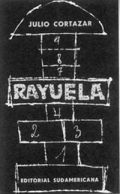 La biblioteca celebra en los meses de diciembre y enero el 50 aniversario del boom latinoamericano. El boom latinoamericano no es un movimiento, ni una escuela, sino un fenómeno editorial y literario en el que un grupo de jóvenes talentos fueron capaces de crear obras originales, atrayentes y rompedoras, exportando por primera vez la literatura latinoamericana fuera de sus fronteras.
La biblioteca celebra en los meses de diciembre y enero el 50 aniversario del boom latinoamericano. El boom latinoamericano no es un movimiento, ni una escuela, sino un fenómeno editorial y literario en el que un grupo de jóvenes talentos fueron capaces de crear obras originales, atrayentes y rompedoras, exportando por primera vez la literatura latinoamericana fuera de sus fronteras.
Surgió en la década de los sesenta y revolucionó la literatura latinoamericana teniendo un impacto y una influencia a nivel mundial que todavía perdura.
As it had to be, our topic for December and January is the 50th anniversary of the Latin American Boom. It is not a movement or a school; it can be seen as a literary and publishing phenomenon in which a group of young talents were able to create original, appealing and groundbreaking works, spreading Latin American literature outside its frontiers for the first time.
It started in the 60s and it revolutionized Latin American literature causing great impact and influencing worldwide literature. Currently this influence is still present.
Audiolibro de la semana | Audiobook of the Week: Asuntos propios
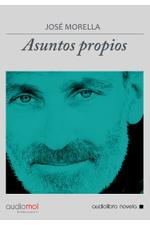 Asuntos propios de José Morella es el audiolibro propuesto esta semana. Descargarlo es tan fácil como coger tu carnet de biblioteca y hacer click aquí.
Asuntos propios de José Morella es el audiolibro propuesto esta semana. Descargarlo es tan fácil como coger tu carnet de biblioteca y hacer click aquí.
Roberto es un hombre acostumbrado a hacer lo que le da la gana. Un hombre independiente. Se jubiló hace seis años, pero, a sus setenta y un años, sigue traduciendo. Y cada mañana se sienta delante del ordenador, y traduce durante horas. La señora Dolores, la portera, sube a limpiar el piso un par de veces por semana pero cuando sufre una embolia y ya no puede volver a trabajar, Isabel, la hija de Roberto, insiste en que su padre pida una asistenta.
Un lunes, Jacinta llama a la puerta. Su belleza y su carácter impresionan a Roberto, y enseguida surge algo entre ellos. Entre esa mujer, que sabe que siempre será una extranjera que genera una sorda desconfianza entre los locales, y ese hombre culto, aún ávido de vida, surge una relación que subvierte sus vidas y las de los que les rodean.
Porque su goce suscita odios y revela prejuicios que nadie cree tener, pone en cuestión el limbo terrible al que los hijos condenan a los padres, los jóvenes a los viejos, los iguales a los diferentes. Una elegante, sagaz fábula de la cotidianeidad, llena de inesperadas facetas a descubrir.
This week we suggest you Asuntos propios by José Morella. Downloading this audiobook is as easy as taking you library card and making click here.
Roberto is someone who is used to do whatever he wants. An independent man. He´s been retired for six years but even though he´s 71 years old, he still translates every day for hours.
Ms Dolores, the caretaker, cleans up his apartment twice a week but when he suffers an embolism and cannot work anymore, Isabel, Roberto´s daughter, wants his father to get someone who looks after him.
One day, Jacinta knocks on the door. Her beauty and personality impress Roberto and there is an instant connection between them. A relationship is born between Jacinta, who knows that she always will be a foreigner and locals won´t trust her, and Roberto who is an educated man, still eager for life. This relationship changes their lives and the lives of those who surround them.
Their joy arouses hatred and reveals prejudices that everybody thinks they don´t have. It calls into question the terrible limbo where children condemn their parents, young people to old people,similar people to different people. This is an elegant, sharp fable of everyday life, full of unexpected sides to discover.
Autor del mes | Author of the month: Luis Alberto de Cuenca
Luis Alberto de Cuenca es nuestro autor seleccionado para los meses de diciembre y enero. Nació en Madrid en 1950 y es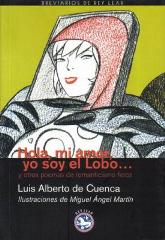 autor de una numerosa producción como poeta, traductor y ensayista. Empezó la carrera de Derecho pero pronto la abandonó para licenciarse en Filología Clásica. Posteriormente obtuvo el doctorado y ha ocupado cargos tan destacados como el de Secretario de Estado de Cultura y director de la Biblioteca Nacional.
autor de una numerosa producción como poeta, traductor y ensayista. Empezó la carrera de Derecho pero pronto la abandonó para licenciarse en Filología Clásica. Posteriormente obtuvo el doctorado y ha ocupado cargos tan destacados como el de Secretario de Estado de Cultura y director de la Biblioteca Nacional.
Es uno de los poetas contemporáneos más destacados del panorama nacional, alternando formas clásicas y modernas dentro de un estilo muy personal que le ha valido el reconocimiento de la crítica especializada. Su obra poética se inicia en 1971 con Los retratos y prosigue con Elsinore, Scholia y Necrofilia, en la línea de la poesía culturalista.
La ironía, el lenguaje coloquial, el distanciamiento, o la mezcla de lo cotidiano y lo irreal, son rasgos perceptibles a partir de La caja de plata, que obtuvo el Premio de la Crítica en 1986.
Luis Alberto de Cuenca is the author of the month in December and January. He was born in Madrid in 1950 and is the author of a vast production as poet, translator and essayist. He started to study Law but soon he dropped out and he graduated in Classical Philology. He later obtained a PhD and he was Estate Secretary of the Ministry of Culture and Director of the National Library.
He is one of the most remarkable poets in the national scene, combining classic and modern forms. His unique style has received critical recognition. His poetic work started in 1971 with Los retratos and continued with Elsinore,Scholia and Necrofilia, which are part of the so called Culturalist Poetry.
Irony, colloquial language, distancing, the everyday and the transcendental intermingling are elements of his poems since La caja de plata which won the Critics Award in 1986.
Novedades en la biblioteca: diciembre 2012, enero 2013 / New to the library: December 2012, January 2013
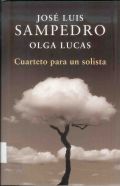 Las novedades de la biblioteca pueden ser consultadas en nuestro catálogo en línea, como es habitual.
Las novedades de la biblioteca pueden ser consultadas en nuestro catálogo en línea, como es habitual.
Para ello, seleccione ÚLTIMAS ADQUISICIONES y elija el período de tiempo que le interesa: ”el último mes” o “los últimos tres meses”.
Ésta es nuestra selección para los meses de diciembre de 2012 y enero de 2013.
The lastest additions to the library catalogue can be consulted on line as usual.
Click ÚLTIMAS ADQUISICIONES and choose the time period: “el último mes” or “los tres últimos
meses”.
This is our selection for December 2012 and January 2013.
Audiolibro de la semana | Audiobook of the Week: El caldero de oro
El audiolibro que te proponemos esta semana es El caldero de oro de José María Merino. Si deseas descargártelo, solo necesitas dos cosas: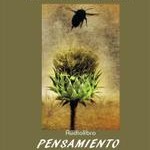 tener a mano tu carnet de biblioteca y hacer click aquí.
tener a mano tu carnet de biblioteca y hacer click aquí.
Es esta novela, el relato de un tiempo mítico que reúne en sí el pasado y el presente, marcado por las invasiones y los olvidos, origen y testigo de las vidas de quienes lo poblaron desde su principio. El caldero de oro será el símbolo de las estirpes que vivieron junto al río milenario, leyenda fundacional, símbolo insoslayable de la infancia de un protagonista que, un día, regresará al pueblo de sus antepasados, abandonado y solitario, para encontrase con un destino encerrado en su propia historia.
Narrada desde la memoria y la imaginación sustentada en un lenguaje que no olvida nunca su condición reveladora, El caldero de oro es una de las obras que evidencian la renovada vitalidad de la literatura española.
The audiobook of this week is El caldero de oro by José María Merino. If you wish to download it, you just need to follow two steps: take your library card and make click here.
This is a story about a mythical time that links past and present, a time marked by invasions and obscurity that is origin and witness of the lives who inhabited it since the beginning. The golden caldron is symbol of the lineage that lived next to the thousand-year-old river. It´s the original legend, the inescapable symbol of the main character´s childhood who one day comes back to the abandoned and lonely village where his ancestors lived to meet a destiny locked in its own history.
This story is told from the memory and imagination and it´s nurtured by a language that never forgets its revealing condition. El caldero de oro is one of the novels that show the renewed vitality of Spanish literature.
Interview with Luis Alberto de Cuenca
Luis Alberto de Cuenca: Love is a nightmare and a wonderful dream. It’s both and, in general, it’s both at the same time
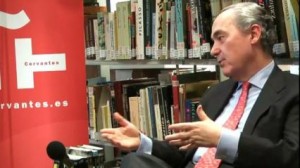
Interview with Luis Alberto de Cuenca held on 28th November 2012 at the Dámaso Alonso Library of the Instituto Cervantes in Dublin on the occasion of his participation in the round table discussion “Many worlds” with Alicia Mariño and Jorge Edwards.
Luis Alberto de Cuenca (Madrid, 1950) is a philologist, poet, translator and essayist. He has a Ph.D. in Classical Philology, and has been director of the Institute of Philology of the CSIC (Superior Council for Scientific Research), director of the National Library of Spain, as well as Secretary of State for Culture. He won the Premio de la Crítica prize with La caja de plata in 1985 and the National Translation Prize for Cantar de Valtario in 1987. Among the authors he has translated are Homer, Euripides, Callimachus, Charles Nodier and Gérard de Nerval. In 2010 he was elected as Numerary of the Royal Academy of History, and took up his post on February 6, 2011. His acceptance speech was titled “History and Poetry”. Some of his work has been translated into French, German, Italian, English and Bulgarian.
Carmen Sanjulián: —Luis Alberto, we’ll start with something easy: a childhood memory.
Luis Alberto de Cuenca: —A boy in a little apron sitting on a wing armchair, with a pointed paper hat, like a cone, which was meant to look like Napoleon’s.
Carmen Sanjulián: —If you were an animal, which animal would you be?
Luis Alberto de Cuenca: —Well, I already am an animal, because when you get down to it we’re all animals, more or less developed, but still animals at the end of the day. But if I were, and if I believed in reincarnation, I’d like to come back as one of three animals which I think are wonderful because of the great role they always play in the epics: a dog, an eagle or a horse.
Carmen Sanjulián: —What makes you angry?
Luis Alberto de Cuenca: —For example, arriving late. I’m very punctual.
Carmen Sanjulián: —And what makes you laugh?
Luis Alberto de Cuenca: —Comedy films. For example, I’m fascinated by North American silent movies.
Carmen Sanjulián: —Is there anything you would never lend?
Luis Alberto de Cuenca: —I always end up lending things which I should never have leant: books, the things I love most in the world.
Carmen Sanjulián: —Madrid. What does that word bring to mind?
Luis Alberto de Cuenca: —Something wonderful, and aside from that, my roots, because I’m from Madrid, going back seven or eight generations, so… for me, it’s a wonderful place and I love living there. It’s beautiful in spite of everything.
Carmen Sanjulián: —History and poetry. What ties them together?
Luis Alberto de Cuenca: —Amongst other things, in representations of the muses, Clio and Calliope, the muse of poetry, are always side by side so, in that sense, they have always had a very close link, even from ancient times. And looking at it from another angle, the great primitive epic poems were the most important historical source before the beginning of recorded history. The ancient Greeks used Homer in their learning and they believed that what Homer recounted had really happened. Then, poetry was also history at some point in its conceptual development.
Carmen Sanjulián: —Is love a nightmare?
Luis Alberto de Cuenca: —And a wonderful dream, it’s both and, in general, it’s both at the same time.
Carmen Sanjulián: —Are you nostalgic about anything?
Luis Alberto de Cuenca: —I am… about practically everything. The etymology of nostalgia is the Greek for the pain of returning, the pain we always feel when we return, like Ulysses when he went back to Ithaca. We’re always returning to things in our lives, and each time we leave shreds of ourselves along with way.
Carmen Sanjulián: —Why do we lie?
Luis Alberto de Cuenca: —Because lying is necessary. Borges says, in “Fragments of an Apocryphal Gospel”, a wonderful prose poem which includes in Praise of Darkness, that no one is capable of spending 24 hours without having lied, and having absolutely had to do so, at least ten times.
Carmen Sanjulián: —Your favourite writer.
Luis Alberto de Cuenca: —Now that I’ve mentioned Borges, Borges.
Carmen Sanjulián: —Night or Day?
Luis Alberto de Cuenca: —Day, every time. The night terrifies me, it frightens me. Night is the messenger of death.
Carmen Sanjulián: —What do you fear?
Luis Alberto de Cuenca: —I fear the passing of time which consumes us at an increasing rate each day and I’m afraid of the dark, for example. I’m also afraid of the night, those sorts of things. Not horror films, though. I do like them.
Carmen Sanjulián: Is it really possible to forget?
Luis Alberto de Cuenca: —Speaking about precisely that, Cernuda said “I can forget you, but not ignore you”. It is possible to forget, but there are things which can’t be ignored, even if they can be forgotten.
Carmen Sanjulián: —Is there pleasure in sadness?
Luis Alberto de Cuenca: —Yes, sadness can be one of the important psychological resources we use to deal with life, because man is the only animal capable of being happy at times and sad at others. Happiness and sadness are categories that are only found in the human animal.
Carmen Sanjulián: —A library.
Luis Alberto de Cuenca: —Any library. For example, this morning I saw a wonderful one, in Trinity College, so that’s the one I’d choose. But I’ve also seen dream libraries, such as the Joanina library in Coimbra, for example, the Vatican library, or I don’t know… the Michelozzo Library of San Marco in Florence. There are so many beautiful libraries… Higgins’s library, inPygmalion by George Bernard Shaw, the Irishman. There are so many sublime libraries…
Carmen Sanjulián: —What are today’s legends?
Luis Alberto de Cuenca: —The same ones that have always been around. I don’t think our concept of what a “legend” is has changed much. Legends explain the world around us, they allow us to dream that there might be an explanation for things. And then there’s another concept, another meaning of the word legend which refers to a role model. You can say “Kennedy is a legend”, or “Eddy Merckx is a legend in cycling”, but that’s not what you’re asking about in your question. The meaning we’re referring to here is more the meaning of a legend as a sacred, real, or primeval story and, in that sense, we’re exactly the same today as the cavemen were, a bit more brutal, but very similar.
Carmen Sanjulián: —Do you think about old friends much?
Luis Alberto de Cuenca: —Yes, of course I think about old friends. Lots of them are gone, because I also lived through a very turbulent time in Spain’s history during the ’80s, when a few irresponsible politicians advised people to take drugs and said nothing mattered. Lots of them went down that path and of course I think about them. They left this Earth much earlier than they should have.
Carmen Sanjulián: —Film or theatre?
Luis Alberto de Cuenca: —Film.
Carmen Sanjulián: —A colour.
Luis Alberto de Cuenca: —Yellow.
Carmen Sanjulián: —Why?
Luis Alberto de Cuenca: —What’s funny is that having just said film instead of theatre, yellow is a colour that theatre actors hate because, in fact, Molière died on stage dressed in yellow.
Carmen Sanjulián: —A wish.
Luis Alberto de Cuenca: —Well, for example, seeing as we’re here in Ireland, I’d wish for a united Ireland, for Ulster to belong to the Republic once more.
Carmen Sanjulián: —What does Ireland bring to mind? What do you like about Ireland?
Luis Alberto de Cuenca: —Lots of things. I love that we have our Catholic faith in common, for example. I’m amazed at how down-to-earth people are, and how friendly they are. I say that because I’ve known lots of Irish people, before coming to Ireland, a country I’m only getting to know now. And I’m also fascinated by its marvellous history. And I think what amazes me the most about Ireland is that during the dark ages, between the 6th and 8th centuries, up in the scriptoria in the monasteries, the monks took on the legacy of the classical tradition and rescued it, hidden away from the rest of the world on a remote island, and preserved all of Greco-Roman heritage for us.
Carmen Sanjulián: —We’re going to finish with a poem; it’s called “Ireland”.
Luis Alberto de Cuenca: —It’s from the book Sin miedo ni esperanza, from 2002.
Carmen Sanjulián: —What inspired this poem?
Luis Alberto de Cuenca: —It came about at a meeting of National Library directors, back in 1998, where I met the then director of the National Library of Ireland, which I visited earlier today. I met her and thought she was a wonderful lady, she seemed so fascinating and unpretentious, so down-to-earth, such a nice person, that I decided to write an ode to Ireland. I was bored at the meetings and I wrote a poem.
IRLANDA
Por Edward, lord Dunsany, que cantara
las gestas de un caballo de madera
en un cuento muy bello; por el libro
de Kells, iluminado por los ángeles;
por nuestra fe católica, basada
en la benevolencia de María
y no en la crueldad del dios hebreo;
por San Patricio, que te dio las cruces
de piedra que jalonan tus caminos;
por el héroe Cuchulainn y por Molly
Bloom, que lo atrajo hacia sus senos
y le dijo que sí, que lo quería,
en la última frase del Ulysses,
yo te saludo, Irlanda, esta mañana
de septiembre en que todo está borroso
menos la geografía de tu isla,
desde donde me envías a la cárcel
un mensaje cargado de futuro.
[IRELAND
For Edward, Lord Dunsany who regaled
the heroic deeds of a wooden horse
in a beautiful tale; for the Book
of Kells, illuminated by angels;
for our Catholic faith, founded
on the kindness of Mary
and not the cruelty of the Hebrew God;
for St. Patrick, who gave you the crosses
made of stone that mark your paths;
for the hero Cuchulainn and for Molly
Bloom, that drew him to her breasts
and told him Yes, she loved him,
in the last phrase of Ulysses,
I salute you, Ireland, this September
morn in which all is blurred
but for the geography of your isle,
from where you sent to me in prison
a message loaded with future.]
(Translated by Emer Cassidy)
Recommended links
- [Video] Interview with Luis Alberto de Cuenca at the Instituto Cervantes in Dublin by Carmen Sanjulián
- Poems by Luis Alberto de Cuenca in A media voz.
- Luis Alberto de Cuenca’s library in El Mundo.
- Luis Alberto de Cuenca and Loquillo. Poetry and rock in El Cultural.
